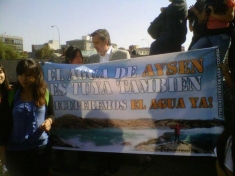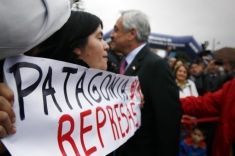Chileans Want Their Rivers Back
Chileans took to the streets Monday – in celebration of Earth Day – to demand that the state regain control of water management in Chile. More than 6,000 people, including many of our partners, took part in a peaceful march through the streets of Santiago “for the recovery and defense of water” (similar events also took place in Aysén). As part of the day’s actions, demonstrators delivered a letter to President Piñera expressing their concerns over water shortages facing local communities throughout the country and calling for a repeal to Chile’s Water Code, a legacy of privatization left over from the Pinochet dictatorship.
These water shortages are due not only to persistent drought, but to structural problems stemming from the policies that govern the exploitation of natural resources in Chile. Under the Pinochet dictatorship, a Water Code passed in 1981 made water private property, giving the state power to grant water use rights to companies free of charge and in perpetuity. The Code allows water-use rights to be bought, sold or leased without taking into consideration local priorities or needs. Water is defined as both a “national public good” and a “market asset” in the Code, two often-opposing perspectives. It is a code that “favors profits and the wealthy,” as one activist at the march put it.
(An excellent report published by Chile Sustentable in 2010 explores just how disastrous this process has been for the people of Chile, and for the ecosystems and water supplies.)
Chile has gone further than any other country in the world in commodifying water and creating a market economy based on private water rights. This plays a central role in the controversy surrounding HidroAysén and plans to dam the rivers of Patagonia. Endesa – one of the companies behind HidroAysén – owns roughly 80% of the water rights in southern Chile, including on the Baker, Pascua and Futaleufú rivers.

HidroAysén continues to be a politically divisive issue in Chile, as well as a very publically unpopular one. During his term, President Piñera has suffered high disapproval ratings largely due to his support for HidroAysén. In June 2011 his disapproval rating reached the highest mark of any Chilean president since the return of democracy in 1990. (Just to put it into perspective, this came just six months after the successful rescue of the 33 miners who had been trapped for 10 weeks, after which Piñera’s approval rating reached 63%. By June, it was back down to 36%.) It’s an election year in Chile and as the president finishes out his final months in office, the specter of just how much controversy the project has stirred over the past three years appears to be haunting him. Decisions relating directly to HidroAysén – including the meeting of the Comite de Ministros scheduled for last month to respond to legal appeals surrounding the project’s Environmental Impact Assessment – have been delayed. New dates have been tentatively proposed for 2014, further punting the HidroAysén controversy off Piñera’s plate and squarely into the lap of the next president.

It seems that in his final months Piñera is attempting to distance himself from the project, at least publically. Instead his administration – with strong backing from the private sector – is trying to fast track two laws currently in the Senate; one streamlines electricity concessions, and the other would implement a public electricity highway. These laws have been coined las leyes de HidroAysén (laws of HidroAysén). This legal infrastructure would limit the public consultation process and allow the project to bypass many of the problems involved in building their own transmission line. These laws not only hold implications for HidroAysén, but also for other projects planned for Patagonia’s rivers and throughout Chile. Above all they threaten to solidify a corporate-run energy structure in Chile.
Questions over Chile’s energy future are expected to be central to this year’s presidential elections. Patagonia Sin Represas recently launched a “Vota Sin Represas” campaign that calls on all of the presidential candidates to make public their position towards the HidroAysén project. One of the first candidates to face this test was former president Michelle Bachelet, who officially announced her run for re-election in March. When asked directly about HidroAysén in an interview with Chilean paper The Clinic, Bachelet responded, “…any project of this size will not be at the cost of the environmental heritage of the country, its natural beauty and without consideration for people living in these areas.”
By this measure it’s clear that HidroAysén should never be built. Let us hope that if Ms. Bachelet does become the next president, she is held accountable to this statement and leaves a far better legacy the second time around by stopping HidroAysén once and for all.



